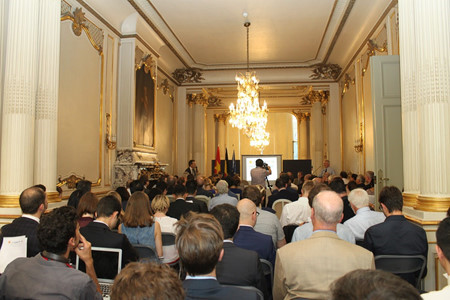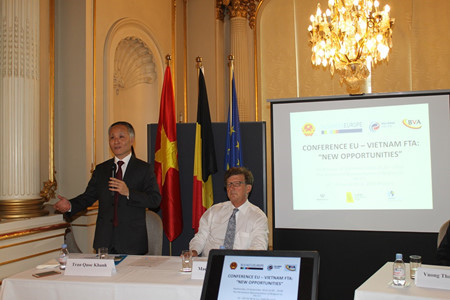 The "EU-Vietnam FTA: New Opportunities” conference
The "EU-Vietnam FTA: New Opportunities” conference
Since signing the agreement in December, 2015, both sides have sped up legal revision process towards its verification.
A conference entitled “EU-Vietnam FTA: New Opportunities” was held in Brussels in September. The delegates were informed that both Vietnam and the EU have worked to keep the agreement on track.
Mutual benefit
When the EU-Vietnam Free Trade Agreement comes into effect, it will generate great tariff advantages for commodities of both sides.
The EU will remove import tariffs for about 85.6% of Vietnamese goods immediately and 99% of its tariffs after 5 years and clear all import tariffs after 7 years.
Vietnam commits to remove 65% of import tariffs for EU commodities when the agreement comes into effect and 99% of its tariffs within 10 years.
EU machines and equipment will be tax free when the FTA comes into force or within 5 years. Vietnam agrees to reduce the import tax rate to zero for cars and motorbikes in the 9th and 10th year.
Taxes on wine, beer, pork, and chicken will also be cleared within 10 years. EU Chief Negotiator for the EVFTA Mauro Petriccione said Europeans should realize that their welfare depends on trade.
They should be aware that FTAs contribute a great deal to their prosperity, Mauro said.
Consumers in Vietnam and the EU will be able to buy high quality products at reasonable prices.
Businesses on both sides will face tough competition as well as a great opportunity to penetrate and earn profits from the other’s markets.
With the establishment of the ASEAN Community, EU businesses can expand their business with ASEAN countries through Vietnam.
To keep the EVFTA on track
 Vietnam’s Chief negotiator for EVFTA and Deputy Minister of Industry and Trade Tran Quoc Khanh spoke at the conference.
Vietnam’s Chief negotiator for EVFTA and Deputy Minister of Industry and Trade Tran Quoc Khanh spoke at the conference.
To ensure the EVFTA’s progress, Vietnam has adopted inventive policies to attract foreign investment and open government procurement markets to EU businesses.
Vietnam’s Chief negotiator for EVFTA, Deputy Minister of Industry and Trade Tran Quoc Khanh said, “We’ve worked out a specific roadmap and both sides have closely followed the progress. This is the 2nd legal review and one or two more legal review sessions will be held before the end of this year. We’ll have to translate the documents before entering other stages.”
The EU’s Chief Negotiator for the EVFTA Mauro Petriccione said the EU has a rule for fast ratification of the agreement before its member states ratify it. Vietnam and the EU are set to put the EVFTA into effect in 2018.
“We are on the legal review step and we have kept to our schedule. There are a lot of technical issues but we expect to complete legal review by the end of this year. Then we have to translate the agreement into Vietnamese and all the EU languages. We hope to reduce the time for translating the documents,” he said.
It took 2 and half years to conclude the EVFTA negotiation, an impressively short time for an FTA negotiation.